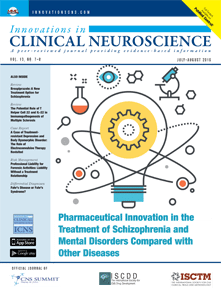Innov Clin Neurosci. 2016;13(7–8):13–14.
 Dear Editor:
Dear Editor:
Substance use disorders frequently coexist with and complicate the treatment of mood and anxiety disorders. Gabapentin is one of the most commonly prescribed off-label medications in psychiatric settings.[1] Despite limited evidence, it has been used frequently in the treatment of mood and anxiety disorders in patients with comorbid substance use disorders. There is growing concern for adverse effects seen with use of gabapentin in this patient population. We report a case of gabapentin misuse in a patient with comorbid bipolar and substance use disorders.
Case vignette. A 33-year-old man with a history of bipolar disorder and comorbid alcohol, benzodiazepine, cocaine, and marijuana use, presented to our clinic for a crisis outpatient appointment. The patient was recently discharged from the hospital with a 30-day supply of gabapentin 600mg BID (twice daily) but had run out of the medication within three days. The patient admitted to overusing gabapentin significantly more than the prescribed daily amount, as it made him “feel good.” Once he ran out of gabapentin, he began using alprazolam that he purchased off the streets; he also relapsed into alcohol and cocaine use. In addition, he reported previous incidents of combining gabapentin with cocaine, alcohol, and over-the-counter sleep aids to get high.
The patient’s history was significant for numerous hospitalizations over the last decade, with episodes of mood instability, irritability, threatening, and aggressive behavior. The patient had been incarcerated on a number of occasions for brief periods of time for charges related to driving under the influence, violation of probation, and resisting arrest. While in jail, he participated in the mandatory substance abuse treatment programs but failed to continue with drug treatment as an outpatient. Over the course of his illness, the patient had been treated with a wide range of mood stabilizers, antidepressants, and antipsychotics. The patient demonstrated limited insight into his illness and his poor adherence to medications.
Discussion. Developed as a gamma-aminobutyric acid (GABA) analog, gabapentin lacks direct action on GABA receptors. It binds to and blocks the alpha-2-delta-1 subunit of pre-synaptic, voltage-gated calcium channels, which leads to decreased release of the excitatory neurotransmitters glutamate, noradrenaline, and substance P. This leads to the inhibitory effects in the central and peripheral nervous system, which explains its anti-convulsant and neuropathic pain relieving effects. Even though it lacks direct action on GABA receptors, gabapentin indirectly leads to increased GABA availability and is also thought to have a direct or indirect potentiating effect on the dopaminergic reward pathway,[2] which may explain the reported anxiolytic and anti-craving benefits of gabapentin. Gabapentin is well tolerated with minimal drug-drug interactions and is cleared unchanged by the kidneys. However, there is growing concern regarding the abuse and diversion of gabapentin.[3] There are reports in the literature of gabapentin’s misuse in combination with alcohol, cocaine, benzodiazepines, and opiates to potentiate their effects and as a substitute drug to the lessen the impact of withdrawal when a user’s drug(s) of choice is(are) not available.[4] Some of the sought-after effects of gabapentin include sedation, euphoria, and psychedelic and dissociative experiences. Withdrawal symptoms, including tachycardia, hypertension, sweating, restlessness, disorientation, and confusion following abrupt discontinuation of gabapentin, have been reported as well.
An accumulating body of evidence supports the theory that patients with certain pharmacological and behaviorial histories related to substance abuse are at an increased risk for the comorbid misuse of GABA-ergic agents.[5–7] Our patient, who was hospitalized following three days of heavy gabapentin use, had a significant history of comorbid mood and substance use disorders, had been incarcerated multiple times for crimes that likely were related to his comorbid mental conditions, and showed little insight into his illness. As our case illustrates, the abrupt discontinuation of gabapentin in certain patients may cause withdrawal symptoms and may lead to a relapse of drug-seeking behavior and abuse of illicit drugs with sedative and non-sedative properties.
Conclusion. Collectively, behavioral changes that include dose escalation and/or self-administration of gabapentin or withdrawal symptoms and/or indications of relapse into illicit drug use following the abrupt discontinuation of gabapentin are indicative of gabapentin misuse. Prescribing clinicians should take these factors into consideration when prescribing gabapentin and educate their patients about its risks. In particular, clinicians should closely monitor those patients with sigificant histories of comorbid mood and substance use disorders when prescribing gabapentin due to the increased risk of gabapentin’s misuse among this patient population.
References.
1. Berlin RK, Butler PM, Perloff MD. Gabapentin therapy in psychiatric disorders: a systematic review. Primary Care Companion CNS Disord. 2015;17(5).
2. Mersfelder TL, William HN. Gabapentin abuse, dependence, and withdrawal. Ann Pharmacother. 2016;50(3):229–233.
3. Schifano F. Misuse and abuse of pregabalin and gabapentin: cause for concern? CNS Drugs. 2014;28(6):491–496.
4. Bastiaens L, Galus J, Mazur C. Abuse of gabapentin is associated with opioid addiction. Psychiatr Q. 2016; [epub ahead of print].
5. Roache JD, Griffiths RR. Lorazepam and meprobamate dose effects in humans: behavioral effects and abuse liability. J Pharmacol Exp Therapeut. 1987;243:978–988.
6. Griffiths RR, Wolf B. Relative abuse potential of different benzodiazepines in drug abusers. J Clin Psychopharmacol. 1990;10:237–243.
7. Tcheremissine OV, Cherek DR, Lane SL, et al. Individual differences in aggressive responding to intravenous flumazenil administration in adult male parolees. J Psychopharmacol. 2005;19(6):640–647.
With regard,
Oleg V. Tcheremissine, MD, and Durga Prasad Bestha, MBBS
Carolinas HealthCare System, Department of Psychiatry, Charlotte, North Carolina
Funding/financial disclosures.
During the past 3 years, Dr. Tcheremissine received research support from Eli Lilly, Forum, Bristol Myers Squibb; has received honoraria for speaking activities from Otsuka/Lundbeck and Alkermes, has served on advisory board for Otsuka/Lundbeck. Durga P. Bestha, M.D. has nothing to disclose. No funding was received for the preparation of this letter.




